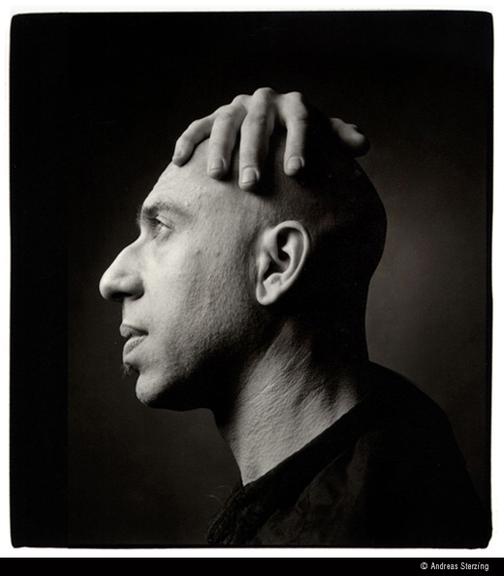Elliott Sharp 'Sharp plays Monk' (USA)
For many, it’s quite a surprise to listen to Elliott Sharp performing Thelonious Monk’s tunes. Knowing his fondness for extreme situations in the fields of noise music, experimental rock and hardcore improvisation, his use of a selection of compositions considered “standards” of the be bop school, written by one of the top figures in the history of jazz, can seem a bit strange. To understand it, we have to go deeper in the musical universe of this guitarist who also plays other instruments – tenor and soprano saxophones, bass clarinet, computer electronics, etc. – and invented some string ones (the slab and the pantar, for instance). Sharp’s music can be extreme, expressionistic, “savage” (there’s something of the B’ambuti pygmies even in his pieces for classical string quartet) and with lots of feedback and distortion, but that’s only some of its characteristics. There’s other sides, like his love for mathematics, using the Fibonacci series and the golden numbers in a complex and demanding compositional work having everything to do with Xenakis’, Ligeti’s and Stockhausen’s concepts. Sure he likes to pump up the volume of his amplifier, but there’s structures in what he does, preventing it to be just aleatoric, and when you speak about structures you must point a master in structuring improvisation – Monk, precisely. Elliott Sharp himself says it all in the liner notes of “Sharp? Monk? Sharp! Monk!”: “My ears and heart tended towards sonic excess, but Monk was always there to clarify with his tart harmonies and percussive attack, his catchy but twisted melodies, and his incredibly rhythmic motion, always dry and economical.” This is not a paradox – even radical music needs to have rules of some kind, and Thelonious Monk, in its weird simplicity and openness, was a genious in using patterns and process figures. Sharp arranged very known scores like “Bemsha Swing”, “Round Midnight” and “Misterioso” for acoustic guitar, the Dell Arte Grande Bouche he prefers when playing blues, and the “fingerpicked bop” (his words) of this disc isn’t very far from the mother of the jazz idiom. His interpretations of the master’s ideas are unusual and maybe sometimes bizarre, but he connects him even more with the continuum of the African-American tradition. The notion that avant-garde playing is a refusal of the past is no longer true, if it ever was. A great record to cherish and keep.
Polymath musician Elliott Sharp fears nothing creatively. He will as readily dismantle the blues into its atomic components as he will Western European classical music. Or jazz, for that matter. On Sharp? Monk? Sharp! Monk!, Sharp attempts the impossible, that is: a post-modern dissection of five Thelonious Monkpieces, played on guitar no less. Ex vivo Monk could be seen as one of the first musicians to apply post-modern method to music. Fearlessly, Monk readily expanded the tonal and harmonic landscape with crashing dissonances and shoehorned time figures. Monk's music makes for an ideal vehicle for the like-minded Sharp to take a leisurely ride in.
Released in 2006, Sharp? Monk? Sharp! Monk! emerges between two especially productive periods that saw Sharp leading his Terraplane blues project and his more classically-oriented material. Using only an acoustic guitar and his considerable wit, Sharp explores, at length, the bleeding heart of Monk's music. "Well You Needn't" provides him all the necessary room to find every speck of mad Monkian muse while adding a plethora of his own. String slaps and 64th-note hammer-ons are abundant and well placed. The warhorse "'Round Midnight" is transformed into the celestial creak of an abandoned rocking chair in an empty room of your odd aunt's house. Sharp develops Monk's well-worn figures slowly with great drama and plot making.
Sharp's Monk ruminations make for engaging listening, challenging the listener without scaring the s*** out of him or her. "Bemsha Swing" epitomizes the project readily displaying Sharp's keen sense of humor and honor for the jazz tradition of improvisation and pushing the envelope.
